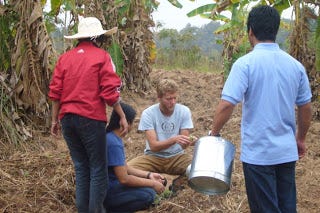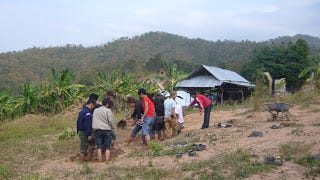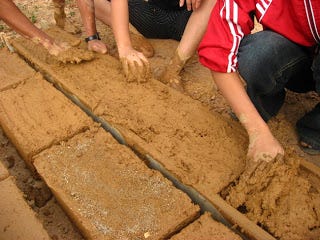I’ve hit a snag over the past few weeks. My work computer became increasingly glitchy and I had to take it in for repairs. I had hoped to time it to maintain an uninterrupted flow of technical content for subscribers. But the repair is more extensive than anticipated and is taking longer than expected. Essentially, every major component - hard drive, memory elements, logic board, keyboard, battery, and a significant portion of the casing - has to be replaced. (Stop me if you’ve heard this one before…)
My wife loaned me her computer for the interim but I don’t have access to some of the tools and applications I use for research, data analysis, and bibliography-building. If everything works out, I’ll get my machine back sometime next week with everything restored and we can pick up where we left off with the technical content.
To fill the time until I’m fully back to work on the book I thought I would share a few stories and anecdotes from fieldwork over the years. This is a bit of a detour from the technical subject matter of biochar water treatment, so let me know in the comments if you object.
I thought I would start with how I came to work on the Thai-Burma border in the first place. In a previous post I described the origins of biochar water treatment, when I was living and working at Pun Pun Centre for Self Reliance in northern Thailand in 2006/2007. It was a string of experiences I that had a Pun Pun and connections I made through that community that led to my work on the border and within Burma.
When I first arrived in SE Asia I knew nothing of (read: “was bone-head ignorant about”) the decades of struggle, repression, exploitation, and violence experienced by the people of Burma/Myanmar. Sadly the struggles continue, exemplified most recently in (another) military coup that actually made international headlines.
I was first inspired to work with and serve the people of Burma - in particular ethnic hill tribe refugees and displaced persons in and around camps along the Thai-Burma border - through a heart-rending exchange I had with a young hill tribe woman who visited Pun Pun along with several of her classmates from a clandestine school in Chiang Mai to take part in a gardening and natural building workshop. I blogged about it at the time and present it here in slightly edited form.
[February 4, 2007]
Last weekend we were visited by a group of seventeen students from a special school in Chiang Mai. These young people, mostly between the ages of twenty and thirty and representing several different indigenous ethnic groups, are refugees from Burma. The school that they attend is sponsored by an NGO that performs research and helps to organize peoples’ actions in response to large-scale “development” projects carried out by governments and multinational corporations The students are taking classes in topics that include environmental science, ecology and sustainability, the political history of Burma and Southeast Asia, economics and globalization, as well as human rights, social movements, nonviolence and gender issues.
A much younger me discussing organic gardening with refugee-students.
I cannot tell you the names of the students, or show any pictures of their faces on this blog. Many of them had to flee violence and terror in Burma and thus have immigrated to Thailand “illegally,” without passports, visas or other official documentation. If the Thai government knew about their school they might conduct a raid, as they have done in the past, and the students could be arrested or deported back to Burma or to the refugee camps along the border of Burma and Thailand. Since many the students have been affiliated with groups that are resisting the actions of the Burmese government and military, and are thus considered “subversive,” if deported to Burma they could face imprisonment and torture there.
Aid organizations for Burmese refugees are illegal in Thailand – the teacher who brought the students to Pun Pun, a Westerner working for the NGO, is technically employed here illegally. The Thai government has had lucrative economic dealings with the Burmese government and so is not in the position to acknowledge the environmental and social destruction the Burmese have carried out through these dealings. But the Thais have begrudgingly made some provisions for refugee camps only under the urging of the international community.
Thus the young people I met this weekend are in effect ghosts – people without a country, without “papers” or official documentation, without citizenship and the rights that we take for granted – people who are not allowed simply to exist, anywhere, and have to receive their education and training clandestinely. They have fled a hostile environment for one somewhat less hostile – here in “democratic” Thailand they at least don’t face the beatings, torture and forced labor that are ever-present threats from the Burmese military. But only rarely can they venture beyond the walls of their school, and always then with the worry that they’ll be caught in a checkpoint and arrested or deported. So their overnight trip to Pun Pun was a special occasion requiring sophisticated choreography of travel to-and-from.
Having a blast in the mud pit making adobe.
Burma is one of these countries that perhaps doesn’t make sense for it to all be administered as one country. There are many different ethnic groups there with different cultures, different languages, different ways of life. The national government is a military dictatorship that frequently comes into violent conflict with different groups around the country vying for autonomy and self-determination. So there are various bands of militias that fight with the government troops, and villagers, hill tribes and other indigenous people are often caught in the middle.
Making adobe bricks.
One of the techniques of the Burmese military – the SPDC, or State Peace and Development Council (how’s that for an Orwellian name?) – in carrying out large-scale development projects such as dams, mining, contract farming operations and natural gas pipelines has been to employ forced labor from the villagers. If the villagers don’t comply they can be beaten, raped, arrested, tortured, killed. In our discussion with the students we talked about how in some of their villages they were required to grow jatropha - an inedible plant whose oil can be used to make bio-diesel. This crop displaced the villagers’ food crops, and when it was harvested was taken by the government without compensation. Villagers are often required to supply soldiers with food and shelter, build security fences, dig ditches, and perform other slavish tasks.
One of the students, a twenty-two year old hill tribe woman – call her “April” – told me of her family’s encounters with the SPDC. In 1996 her oldest brother was forced to work as a porter for the SPDC – he was made to carry ammunition, equipment, etc. for the soldiers on one of their incursions into the territory of a resistance group. He was killed in a battle between the SPDC and the militias. April herself – she was twelve years old at the time – was made to walk ahead of army convoys as a “sweeper.” She and another girl walked ahead of the battalions and trucks and swept the road for land mines. In 1997, April and her family fled Burma and have been living in a refugee camp on the Thai side of the border for the past ten years. She has only been able to leave the refugee camp three times over these ten years, most recently to attend the secret school.
April finished the 10th grade in the refugee camp in 2003, and then through a lucky meeting with a Westerner was able to apply for a scholarship to go to college in Canada. She was awarded the scholarship but could not attend because of immigration issues associated with her lack of official documentation. She was however, able to get a job as a researcher with the Burmese Women’s Union, a human rights NGO based in Chiang Mai. She is excited to go back to Burma later this spring (undercover) to conduct research for one month about the current conditions of some of the hill tribes. She hopes to be able to return to her village one day and establish a school there.
For all the anxiety and suffering April and her classmates have undergone in both Burma and Thailand, they are joyful, equanimous people. During their short time at Pun Pun we had discussions on organic gardening, natural building and the philosophical aspects of local self-reliance. We spent a morning working in the gardens and learning about compost and other organic fertilizers. In the afternoon we made bricks and all worked together mud-plastering the walls of the new meeting hall under construction. We climbed the hill above the community next door to see the pond and swales installed during a recent permaculture course.
The Burmese students ran around shouting and playing on the dam and in the empty pond. I was a bit startled at first by their exuberance but one student turned to me and said, “We never get to do this! Just run around and yell and play and be free this way! This is great!” It’s true – in the repressive atmosphere in Burma and in the secretive environment of their school they can’t run around and goof off and raise the dead with noise and games and laughing. They’ve had precious few opportunities in their lives to behave as proper young people. I’m glad that Pun Pun could provide a safe place for them to be free and relaxed and express themselves; I consider it an unparalleled blessing that I could be here to celebrate, share and learn with them.
Postscript
“April” was kind enough to email me the following essay to share – it’s a greater impact to read her story in her own words. (I have deleted some place and organization names for security.)
My River of Life
I am very grateful for this opportunity to speak out to the rest of the world about my River of Life. I believe it is important to share our stories, our problems, and our hopes.
In 1996, when I was eleven years old and I lived in my village in Burma, in (name deleted) Village in (name deleted) State, my family faced big difficulties: My oldest brother, who was forced to work as a military porter for the SPDC (State Peace and Development Council), sustained a terrible injury during a battle. Then both of my parents fell ill and nearly died. My mother got high blood pressure and my father had malaria. My older sister, my younger brother and I took care of our parents as there was no hospital to take them to. One morning I saw my sister was crying, she told me that “last night Daddy couldn’t breathe very well”. I was afraid my Dad would die. When we lived in the village we didn’t have enough medicine. My mother used to make medicine from tree roots and fruits from the forest. When the other villagers were unwell they came to my mother and asked her to make medicine for them. My mother always helped them, so when my family became ill the other villagers came to help us and we were never alone.
We all suffered in the village. There was not much to eat because our animals died and we couldn’t farm because we had to work for the SPDC every day. One day my mother asked me to work for the SPDC because every one else in my family was weak. I had to represent my family. At the first I didn’t want to go but I felt pity for my parents so I agreed to help and went to the military station with some other villagers. I had to sweep the road two times a day and stoke fires beside the road at night. The huts where we had to stay were far from our homes. At night I was very worried and afraid, and I missed my family and my friends. I cried every night. My aunt who was working with me was very kind to me and she encouraged me every day.
In 1997 the SPDC troops destroyed many villages and my village was destroyed too. The SPDC told every one they had to move by the end of April. At first we moved to another village called (name deleted) which is near to my village. We stayed there about two weeks but then the SPDC told us that the villagers in (name deleted) had to move too. Every villager was tired and angry at the troops but we could not refuse them. It was very difficult to move again and again. We didn’t have a car to carry our paddy (rice) or our furniture so it took a very long time. One night in May 1997 we fled our village and traveled to a refugee camp to try and get away from the military. We started our journey at about two o’clock in the morning so we didn’t draw attention to ourselves. Normally travel from our village to the refugee camp takes only two days, but it took us about three weeks because the military was in the area and we had to wait until they left. We arrived in the camp the end of the May and in June school started. I was pleased to learn that I could study until grade ten (equivalent to schooling to the age of 14 in the UK).
At first we lived in (name deleted) camp on the Thai-Burma border. In 2004 we had to move to (name deleted) camp because water flooded the camp. There were land slides and over twenty five refugees died. In [the refugee camp] we also had to face land slides in the rainy season, as our houses were on the mountain sides. Living in the refugee camp was uncomfortable. You felt like you were under house arrest, especially as the Thai authorities often changed the rules, but I felt better living in the camp than in Burma under the SPDC.
When I finished grade ten I wanted to continue my studies, but my parents weren’t able to help me. Refugee students face serious difficulties in their education. Many are very enthusiastic but we lack opportunity to make our lives better. We only have fish paste and bean curry to eat. We often feel weak as there is not much food and we feel that we don’t have hope for our future. We don't want to stay in the camp any more but we can't go back to our country, it is too dangerous. I was unable to earn money in the camp so I just prayed I would find a way out of the camp so I could study. Some people managed to leave the camp to go to another country to get better lives, but it is difficult and dangerous to live as an immigrant as other countries often don’t want you and you cannot find a job. Some people decided to go back to Burma despite the risks. I was confused about what I should do. My parents asked me to choose the best way for the family. They would permit me to leave the camp to go to another country, but when I said I wanted go back to Burma to my village and help the children with their education they wouldn’t allow me.
In 2005 I met volunteers from the UK who were visiting (name deleted) camp, they soon became my friends. They helped me to improve my English and offered me a scholarship at a college in Canada, but I was unable to take up the offer because of my status as a refugee. So I decided to apply for an internship at an organization in Thailand. On January 27th 2006 I arrived at the [women’s aid NGO] in Chiang Mai. The aim of this organization is to encourage young Burmese ladies to use their skills to engage with the issues affecting them and empower them to participate in making life better for Burmese women. [The NGO] invites women from different Burmese ethnic groups to join. There is no discrimination or divisions based on ethnicity. I studied political empowerment for four months. Through this internship I was given the chance to study at the (name deleted) School this year.
At [the NGO] and the (name deleted) School I have had an opportunity to study many things. When I was in the camp I thought that politics didn’t belong to young people or to women. Today I believe that everyone should participate in politics. It is important to know our country’s political situation. I have met many young people from Burma since I have left the refugee camp. Many of these people say that when we lived in Burma we weren’t able to talk about political issues, so we didn't know our country’s political situation very well. I was the same as them; I worked for the SPDC troops because I thought it was my family’s job to be the property of the SPDC.
Although I managed to get out of the refugee camp and live in Thailand I don't feel free. I feel that I am under house arrest again because we are illegal in this country and I don't have any documents, like many other Burmese refugees. I don’t want to go out because there are Thai police on the road and sometimes they stop people and ask questions. I usually go out only one or two times in a month because I’m afraid that police will arrest me, and I always worry about our security. I left my parents and younger brother in the camp. I don’t want to live away from them, but I need more knowledge so I have to forget them for a few years. I don’t know what will happen in the future.
I have been released from the SPDC’s torture but many people are still victims. I don't want to see my family, my friends or any one as the property of the SPDC any more. The SPDC must stop their violence in my country. I have been hoping for many years that we will get freedom. When I see young people from other countries and they look very free and happy I hope I will be able to be like them. Sometimes I can’t feel happiness because I am worried for myself, my family, and my people. We need to construct a peaceful country. Many Burmese people are thirsty for freedom. We need people from the rest of the world to support us to get freedom as soon as possible.





Josh, Many thanks for the stories. They bring home the need for basic services like household energy, food security, clean water and the sad predicaments of refugees.